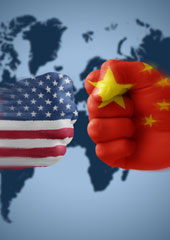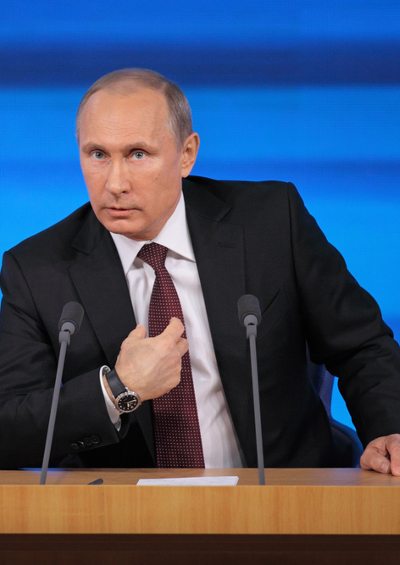China and America: We Are Not Enemies
The two countries will have to cooperate to keep a peaceful world together.
July 9, 2014

In Chinese, we call the United States of America “meiguo (??)” — meaning “a beautiful country.” Nowadays, most Chinese people do not view America as our enemy, but an important partner and super competitor.
Although our two countries indirectly confronted each other during the Korean War and the Vietnam War, we Chinese still remember our friendship and cooperation against Japan during World War II.
In fact, the Chinese people quite admire America’s development miracles achieved within a comparatively short history.
Since China’s opening up in 1978, the Chinese people have been more interested in increasingly close economic and cultural ties with the U.S., instead of ideological conflicts. As the current largest foreign creditor, China sincerely hopes America can stay prosperous rather than go bankrupt.
An imaginary divide
However, in sharp contrast to these positive sentiments, a recent poll shows that Americans now consider China their nemesis. They see China’s growing economic power as a “critical threat” to the “vital interest” of America.
That conveys a really disappointing message to China and the world. It lets the American people appear as hypocritical and arrogant.
The United States has always been proud of its well-known national values of freedom and equality. So why is developing China not allowed fair and peaceful competition with the United States?
A prosperous China is in line with America’s and the whole world’s interests. Nor would anyone rather face a poor and aggressive China – another North Korea, but with more than 50 times the population.
Either way there is still deep distrust and suspicion between our two countries, especially from the U.S. side. As a result, America may be cheering and encouraging its Asian allies like Japan and the Philippines to challenge China more. However, Japan’s hidden agenda may hurt America eventually.
Fair-weather friends
History is a mirror. America may still uphold the outdated foreign policy doctrine, “the enemy of my enemy is my friend,” but is China really the enemy? Even if China is, do not ignore history. America supported Iraq during the Iran-Iraq War, but in the end Saddam Hussein turned his back on the United States.
Therefore, it is definitely unwise to suppress China by supporting Japan. Currently, America may consider Japan’s military “normalization” as a quite good balance to contain China. However, acquiescing to a re-militarized Japan may well bring future trouble, or even disaster, to the U.S. and the whole world.
Like America, China is just pursuing its own “Chinese Dream,” but it has no interest in replacing America’s global leadership. If someday America unfortunately declines, it will be mainly due to its own internal failure, rather than any of China’s doings.
Therefore, Americans should not mistake China as the enemy, simply out of envy of China’s fast growth. Neither should they unwisely give Japan a chance to restore its past militarism. There are no eternal friends. China is learning that its traditional “little brother” — North Korea — could turn into a threat. Similarly, the U.S. should be wary of Japan.
Getting to know each other
Regarding the mutual distrust between the U.S. and China, besides the ideological differences, the “asymmetric information problem” is another main cause.
People in our two countries get to know each other mainly through domestic media reports, which tend to be politically misleading and biased. Such incomplete knowledge leads to misunderstanding and prejudice.
A related problem is that there currently are many more Chinese experts on America than U.S. experts on China, largely because Chinese people are more willing and keen to learn from America.
Over the last seven years the number of Chinese middle school students who went to study in America increased by a factor of 365. Just last year, about 235,000 Chinese students went to the United States for further education.
Luckily the United States is catching up. Since 2010, the Obama Administration has been pushing a plan to have 100,000 U.S. students study in China by 2014. If the American people really want to understand China, try to learn some basic Chinese. Then we can share common understanding.
A new balance of power
At present, the United States of America and China (so-called “G2”) are undoubtedly the most important global players.
To avoid a “hot war” or a new “Cold War,” America as the existing greatest power and China as an emerging one have no other choice than to collectively forge a “new type of great-power relationship.” Coexistence and cooperation must overcome confrontation and conflicts.
Without the cooperation of both nations, none of the big global and regional challenges, such as climate change, terrorism, nuclear proliferation and financial crisis, will likely be addressed.
Our two countries will have to cooperate as they did in World War II to keep a peaceful and prosperous world together, sooner or later.
Takeaways
China and America could forge a new type of great power relationship based on cooperation instead of conflict.
Chinese people admire and look up to the US’s achievements, so what is America afraid of?
The unnecessary distrust and suspicion between the US and China could hurt the whole world.
Is America avoiding its greatest alliance due to fear of China?
China and the US cooperated in World War II. The Chinese have not forgotten this, but Americans might have.
Read previous

How Far Will Putin Go?
July 8, 2014
